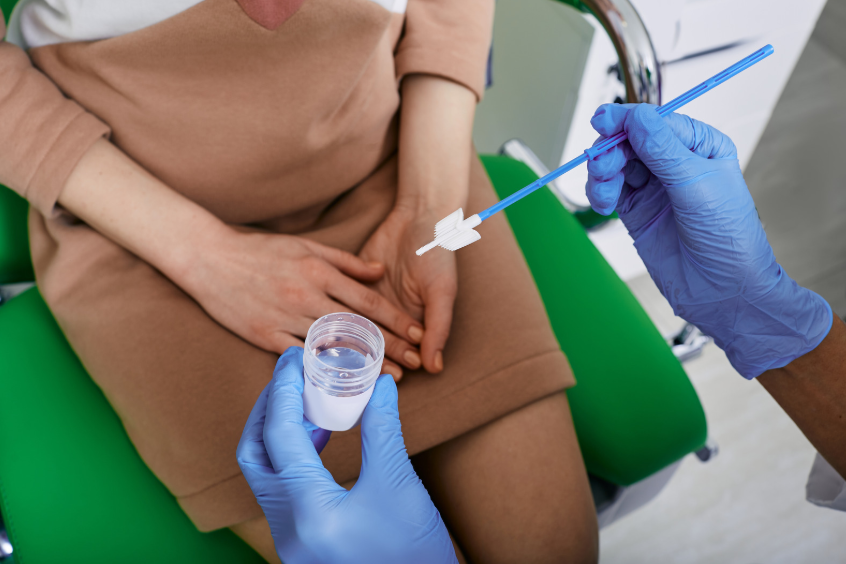A Pap smear is a crucial test for women’s health, helping to detect cervical cancer and other abnormalities at an early stage. This blog will guide you through the entire process of a Pap smear, address common concerns, and explain why it’s essential to get screened regularly.
What Is a Pap Smear and Why Is It Important?
A Pap smear, also known as a Papanicolaou test, is a medical procedure that screens for cervical cancer by collecting cells from the cervix. This simple yet effective test can also identify early signs of HPV (Human Papillomavirus) infections and other abnormalities. Regular Pap smear screenings are essential for detecting issues early, providing timely treatment, and ensuring long-term reproductive health. Precision and care are essential in every Pap smear procedure, giving you peace of mind.
Who Should Get a Pap Smear?
Pap smear screenings are recommended for women aged 21 to 65 as part of routine health checks. The frequency of Pap smears depends on factors like age, sexual activity, and medical history. For example, women aged 21–29 should get a Pap smear every three years, while those aged 30–65 may combine it with an HPV test for extended intervals. Special considerations, such as pregnancy or menopause, may also affect the timing of Pap smear tests. A healthcare professional will guide you through personalised recommendations based on your health needs.
What to Expect During Your Pap Smear Screening
When you arrive for your Pap smear, the friendly staff will ensure you feel at ease. The procedure begins with a brief consultation to discuss your medical history and any concerns. During the Pap smear, you’ll lie comfortably on an exam table while a speculum is gently inserted to allow access to the cervix. A small sample of cervical cells is then collected using a soft brush. The entire Pap smear process is quick, usually taking less than 10 minutes. Advanced techniques are used to make your experience as smooth as possible, focusing on your comfort.
Does a Pap Smear Hurt? Common Concerns and Myths
One of the most common concerns about a Pap smear is whether it’s painful. While some women may experience mild discomfort, the procedure is generally not painful. Experienced practitioners use gentle techniques to minimise any unease. It’s also essential to address myths, such as the belief that Pap smears are only for sexually active women or that they always detect cancer. Pap smears are a preventive measure that screens for cellular changes, and regular screenings are key to staying proactive about your health.
How to Prepare for Your Pap Smear Screening
Preparing for a Pap smear is simple but important to ensure accurate results. Avoid sexual activity, douching, or using vaginal creams for at least 48 hours before your appointment. It’s best to schedule your Pap smear when you’re not menstruating, as this can interfere with the test’s accuracy. Wearing comfortable clothing and arriving with any questions or concerns you may have is recommended. Proper preparation helps make your Pap smear experience seamless and effective.
What Happens After the Pap Smear?
After your Pap smear, the collected sample is sent to a laboratory for analysis. Results are typically available within a few days. A normal Pap smear result indicates no abnormal cell changes, while an abnormal result may require further testing, such as a colposcopy, to examine the cervix more closely. Clear communication about your results and guidance on any necessary follow-up steps ensure you receive comprehensive care every step of the way.
Why Choose This Screening Service for Your Pap Smear?
This screening service stands out as a trusted provider of Pap smear screenings, offering state-of-the-art facilities and compassionate care. Skilled medical professionals are dedicated to making every patient feel comfortable and supported. With a commitment to accuracy and patient education, this service ensures that your Pap smear experience is thorough and stress-free. Choosing this service means prioritising your health with a team you can trust.
Prioritise Your Health
A Pap smear is an essential part of women’s health, providing early detection of cervical abnormalities and ensuring peace of mind. With expertise, advanced technology, and patient-focused care, the best Pap smear experience is possible. Don’t wait—schedule your Pap smear today and take a proactive step toward safeguarding your health!
FAQs About Pap Smear Screenings
Q: How long does a Pap smear take?
A: The procedure itself usually takes less than 10 minutes.
Q: Can I have a Pap smear during pregnancy?
A: Yes, Pap smears are safe during pregnancy, but it’s best to consult your doctor for the optimal timing.
Q: Does an abnormal Pap smear result mean I have cancer?
A: No, an abnormal result indicates cellular changes that may require further evaluation. Early detection is key, which is why regular Pap smears are essential.
This service is here to answer all your questions and guide you through every aspect of your Pap smear screening.




